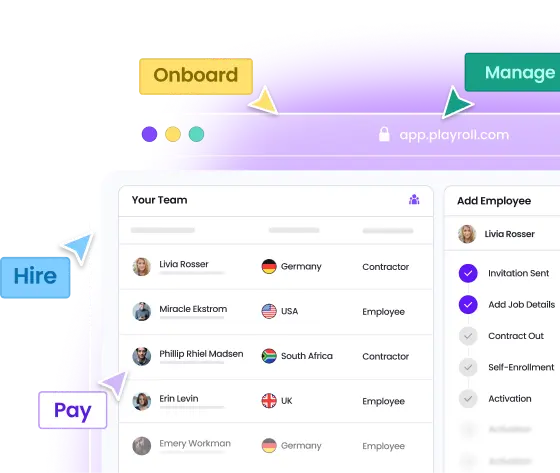What Are the Standard Working Hours In Japan?
The standard working hours for employees aged 18 or older are set at 8 hours per day and 40 hours per week under the Labour Standards Act. An employee whose age is 18 or younger has specific protections that limit working hours and night work.
Employees must receive a minimum meal interval of 45 minutes if they work more than 6 hours a day, and a minimum of 1 hour if working beyond 8 hours. Typical working hours are Monday through Friday, from 9:00 AM to 6:00 PM, including a standard one-hour meal break.
Maximum Working Hours in Japan
The legal cap is 8 hours per day and 40 hours per week.
Employers may require overtime only if:
- There is a labor-management agreement (known as an Article 36 Agreement) with the employees' representative.
- The agreement is filed with the Labor Standards Inspection Office.
Overtime caps were introduced from April 2020:
- Overtime must be less than 100 hours in any single month.
- Cannot exceed 80 hours on average over any two months within six months.
- In principle, overtime hours in Japan should not be longer than 45 hours per month or 360 hours per year. There are extended limits in special circumstances, which can increase the annual overtime to a maximum of 720 hours.
- Overtime beyond 45 hours per month is permitted for up to 6 months per year.
- Exceptions include unavoidable temporary needs and special industries where longer hours are common with required approvals.
Industry Specific Exceptions
Industries such as healthcare, transportation, and emergency services have specific regulations permitting longer or irregular working hours due to the nature of their operations.
For example, medical staff and transport workers may work night shifts or longer hours but must receive appropriate overtime pay and rest protections.
These exceptions differ from standard hours but still require compliance with overtime rules and health/safety monitoring.
Managerial and Exempt Employees
Managerial employees or those in supervisory positions, and those handling confidential matters, are often exempt from overtime rules under Article 41 of the Labour Standards Act.
However, they are still entitled to certain protections like night shift allowances if they work during late hours.
These employees are not subject to the daily 8-hour or weekly 40-hour limits but misclassification risks exist, so employers must be careful.
Statutory Full-Time Working Hours in Japan
Full-time employment is legally defined as 40 hours per week (8 hours per day).
These hours apply generally across industries, although flexible arrangements exist with labor agreements.
Employers must ensure weekly rest days and provide breaks as stipulated by law.
Overtime Regulations in Japan
Overtime is regulated tightly to protect employees from excessive work. Employers must follow legal agreements and limits when requiring overtime and pay statutory premiums accordingly.
What Counts As Overtime in Japan?
Overtime refers to any work exceeding 8 hours per day or 40 hours per week.
Work performed on statutory holidays or rest days also counts as overtime.
Night work (10:00 PM to 5:00 AM) that exceeds normal hours is treated as overtime with additional pay.
Maximum Overtime in Japan
Monthly overtime must not exceed 100 hours.
Average overtime over two consecutive months cannot exceed 80 hours.
Annual overtime is capped at 720 hours.
Exceeding these limits can lead to penalties and increased liability.
Non-compliance with overtime regulations can result in criminal sanctions and fines.
Overtime Payout Rates in Japan
Overtime must be compensated at a minimum of 125% of the normal hourly wage.
If monthly overtime exceeds 60 hours, overtime pay for all hours beyond 60 must be at least 150% (applicable to large companies, with small and medium-sized enterprises required to implement this rate as of April 2025).
Work between 10:00 PM and 5:00 AM requires an additional 25% night work allowance on top of overtime pay.
Work on statutory holidays must be paid at least 135% of the normal rate; if during night hours on holidays, the rate increases to 160%.
Rest Periods and Breaks in Japan
Employees working more than 6 hours must receive at least 45 minutes of rest; those working more than 8 hours must receive at least 1 hour.
Employers must provide at least one rest day per week or four rest days within four weeks.
Meal breaks are mandatory and unpaid; rest breaks are paid.
Pregnant women, young workers, and employees with health concerns have additional protections.
Employers are responsible for ensuring compliance and maintaining accurate records of working hours and breaks.
Night Shifts and Weekend Regulations
Night work is defined as work performed between 10:00 PM and 5:00 AM.
Night shifts require an additional 25% pay on top of the base hourly rate.
Employees under 18, pregnant women, nursing mothers, and those caring for young children generally cannot be required to work night shifts.
Weekend work is permitted but requires appropriate labor-management agreements and overtime pay (minimum 135% for statutory days off).
Employers must carefully monitor fatigue and health risks related to night and weekend work.
Disclaimer
THIS CONTENT IS FOR INFORMATIONAL PURPOSES ONLY AND DOES NOT CONSTITUTE LEGAL OR TAX ADVICE. You should always consult with and rely on your own legal and/or tax advisor(s). Playroll does not provide legal or tax advice. The information is general and not tailored to a specific company or workforce and does not reflect Playroll’s product delivery in any given jurisdiction. Playroll makes no representations or warranties concerning the accuracy, completeness, or timeliness of this information and shall have no liability arising out of or in connection with it, including any loss caused by use of, or reliance on, the information.
.svg)
.svg)
.svg)





.svg)



.png)












.webp)









.svg)